redo Jump to...
print Print...
 (by Allie Bidwell, USNews) – Can you name all three branches of the federal government? How about how many votes it takes to override a presidential veto, or what the first 10 amendments to the Constitution collectively are called?
(by Allie Bidwell, USNews) – Can you name all three branches of the federal government? How about how many votes it takes to override a presidential veto, or what the first 10 amendments to the Constitution collectively are called?
Most American adults cannot correctly answer those basic civics questions, according to a recent survey from the Annenberg Public Policy Center at the University of Pennsylvania – and a growing number of state leaders believe students should be required to pass the same civics test given to immigrants seeking nationalization in order to graduate from high school.
In its survey of more than 1,400 adults, the Annenberg Public Policy Center found just 36 percent could name all three branches of the government, and another 35 percent couldn’t name any. Just more than one-quarter of respondents – 27 percent – correctly answered that a presidential veto can be overturned by a two-thirds vote from both the House and Senate.
“We all sort of laugh at that, but it’s tragically sad at the same time that we all don’t know these very, very basic things,” says Sam Stone, political director of the Civics Education Initiative, a national campaign aiming to get all 50 states to require their high school students to pass the U.S. naturalization civics test (see a sample test under “Resources” below).
The group is backed by many high-profile public figures and former legislators, including former Supreme Court Justice Sandra Day O’Connor, former New York City Mayor Rudy Giuliani, Pulitzer Prize-winning journalist Carl Bernstein and actor Joe Mantegna. Current legislators are also coming on board in support of the initiative.
Seven states – Arizona, Utah, South Dakota, Oklahoma, Missouri, South Carolina and Louisiana – have formally launched the campaign, with another three expected to begin efforts by the end of the year, Stone says. The group’s goal is to get every state to make passing the civics exam a graduation requirement by 2017, to coincide with the 230th anniversary of the signing of the Constitution, Stone adds.
In many states, requiring students to pass the civics exam, which covers 100 facts about American history and civics, will need to be done through legislation.
In Arizona, state Rep. Steve Montenegro, a Republican, announced Wednesday he is in the process of drafting legislation to make passing the exam a graduation requirement.
“Every single student in Arizona and across the United States of America should have basic knowledge and understanding of American government,” Montenegro said during a news conference, according to azcentral.com. “Civics is just common sense.”
Two Utah state lawmakers – Sen. Howard Stephenson and Rep. Steve Eliason, both Republicans – also said Wednesday that they plan to introduce a bill in the next legislative session to require all Utah high school students to pass the exam.
Former Missouri Gov. Bob Holden, who served as a Democratic governor from 2001 to 2005, says he’s working with state legislators to introduce a bill at the beginning of the next legislative session, which begins in January 2015.
“It’s very critical as we enter a truly global economy that our leaders and our citizens have a greater understanding of how our country was formed, the values that have shaped us and the values that will hopefully lead us to continued success,” Holden says.
Most surveys of Americans’ knowledge of U.S. history and civics are striking. The Annenberg survey also found most respondents said they didn’t know which parties control the House and Senate.
Stone says it’s possible that an emphasis on American history and civics has fallen to the wayside in favor of increased focus on science, technology, engineering and math – or STEM – subjects.
“I don’t think anyone is arguing the value of those, but at the same time, I think we’ve lost the focus on a well-rounded curriculum and on giving people as much of an opportunity as possible to explore the world around them,” Stone says.
Requiring students to pass a civics test is one way to draw more attention to the importance of those subjects, but the push is also coming at a time when tensions around testing are hitting the ceiling. Holden says one way to mitigate concerns about over-testing is to find a way to incorporate the questions on history and civics into the testing already in place.
“Anytime you’re talking about change, it becomes somewhat difficult. Everyone likes change as long as it doesn’t affect them,” Holden says. “Let’s make this something that all Americans can get behind, because it’s about our country’s future, and our children’s knowledge of the past to lead them to the future that’s important.”
Reprinted here for educational purposes only. May not be reproduced on other websites without permission from US News & World Report. Visit the website at USNews .com.
Questions
1. What is civics?
2. What civics requirement do a growing number of lawmakers want students to pass in order to graduate from high school?
3. According to a recent Annenberg survey, what percent of American adults could name all three branches of government; what percent couldn’t name any?
4. a) What is the goal of the Civics Education Initiative?
b) List the states that have formally launched the Civics Education Initiative in their schools.
5. a) What knowledge does Arizona state Rep. Steve Montenegro say every student should have?
b) Is the study of Civics part of your state’s required social studies curriculum?
6. Why do you think it is important to have an informed citizenry?
CHALLENGE: Take the sample test. How many answers did you get right?
Challenge a parent or a grandparent to take the test also. Compare your scores.
Background
SAMPLE – Naturalization Self-Test 1 (from: www.uscis.gov)
The naturalization self-test is a study tool to help you test your knowledge of U.S. history and government. The actual civics test is NOT a multiple choice test. The civics test is an oral test. During the naturalization interview, up to 10 questions are asked from the list of 100 questions. Six out of ten questions must be answered correctly to pass the civics portion of the naturalization test.
This practice test contains 25 questions:
[from: www.uscis.gov/citizenship/quiz/learners/study-test/study-materials-civics-test/naturalization-self-test-1]
1. How many justices are on the Supreme Court?
nine (9)
eleven (11)
twelve (12)
ten (10)
2. Who lived in America before the Europeans arrived?
Canadians
Floridians
no one
American Indians
3. What do we call the first ten amendments to the Constitution?
the Bill of Rights
the inalienable rights
the Articles of Confederation
the Declaration of Independence
4. Under our Constitution, some powers belong to the states. What is one power of the states?
coin or print money
create an army
make treaties
provide schooling and education
5. What did Susan B. Anthony do?
fought for women’s rights
the first woman elected to the House of Representatives
made the first flag of the United States
founded the Red Cross
6. What happened at the Constitutional Convention?
The Virginia Declaration of Rights was written.
The Constitution was written.
The Declaration of Independence was written.
The Emancipation Proclamation was written.
7. What are two rights of everyone living in the United States?
freedom to petition the government and freedom to disobey traffic laws
freedom of speech and freedom of worship
freedom of worship and freedom to make treaties with other countries
freedom of speech and freedom to run for president
8. What ocean is on the East Coast of the United States?
Arctic Ocean
Indian Ocean
Pacific Ocean
Atlantic Ocean
9. Name one American Indian tribe in the United States.
Celts
Zawi Chemi
Cherokee
Slavs
10. Name one branch or part of the government.
legislative
parliament
United Nations
state government
11. Who does a U.S. Senator represent?
the state legislatures
all people of the state
only the people in the state who voted for the Senator
all people of the state who belong to the Senator’s political party
12. Who vetoes bills?
the Speaker of the House
the Vice President
the President Pro Tempore
the President
13. What are the two major political parties in the United States?
Reform and Green
Democratic-Republican and Whigs
Democratic and Republican
American and Bull-Moose
14.What is freedom of religion?
You must choose a religion.
No one can practice a religion.
You can practice any religion, or not practice a religion.
You can’t choose the time you practice your religion.
15. The Federalist Papers supported the passage of the U.S. Constitution. Name one of the writers.
George Washington
James Madison
Thomas Jefferson
John Adams
16. What are two Cabinet-level positions?
Secretary of the Interior and Secretary of History
Secretary of Health and Human Services and Secretary of the Navy
Secretary of Weather and Secretary of Energy
Secretary of Homeland Security and Secretary of the Treasury
17. Name the U.S. war between the North and the South.
the Revolutionary War
the War of 1812
World War I
the Civil War
18. How old do citizens have to be to vote for President?
thirty-five (35) and older
twenty-one (21) and older
sixteen (16) and older
eighteen (18) and older
19. If the President can no longer serve, who becomes President?
the President Pro Tempore
the Secretary of State
the Speaker of the House
the Vice President
20. What is the capital of the United States?
Philadelphia, PA
Washington, D.C.
New York, NY
Boston, MA
21. Name one state that borders Mexico.
Alabama
California
Arkansas
Florida
22. Who is in charge of the executive branch?
the Prime Minister
the Speaker of the House
the Chief Justice
the President
23. What is the name of the national anthem?
God Bless the U.S.A.
My Country Tis of Thee
America the Beautiful
The Star-Spangled Banner
24. Who was President during the Great Depression and World War II?
Herbert Hoover
Franklin Roosevelt
Harry Truman
Calvin Coolidge
25. Under our Constitution, some powers belong to the federal government. What is one power of the federal government?
to make treaties
to issue driver’s licenses
to provide schooling
to provide police departments
Resources
For the “100 Civics Questions and Answers with MP3 Audio: uscis.gov/citizenship/learners/study-test/study-materials-civics-test/100-civics-questions-and-answers-mp3-audio-english-version
Take sample tests 2, 3 and 4 at:
Watch Missouri’s Ozarks First News report from 9/18/14:
Sample Test 1 – ANSWERS
1. nine (9)
2. American Indians
3. the Bill of Rights
4. provide schooling and education
5. fought for women’s rights
6. The Constitution was written
7. freedom of speech and freedom of worship
8. Atlantic Ocean
9. Cherokee
10. legislative
11. all people of the state
12. the President
13. Democratic and Republican
14. You can practice any religion, or not practice a religion.
15. James Madison
16. Secretary of Homeland Security and Secretary of the Treasury
17. the Civil War
18. eighteen (18) and older
19. the Vice President
20. Washington, D.C.
21. California
22. the President
23. The Star-Spangled Banner
24. Franklin Roosevelt
25. to make treaties
Daily “Answers” emails are provided for Daily News Articles, Tuesday’s World Events and Friday’s News Quiz.



